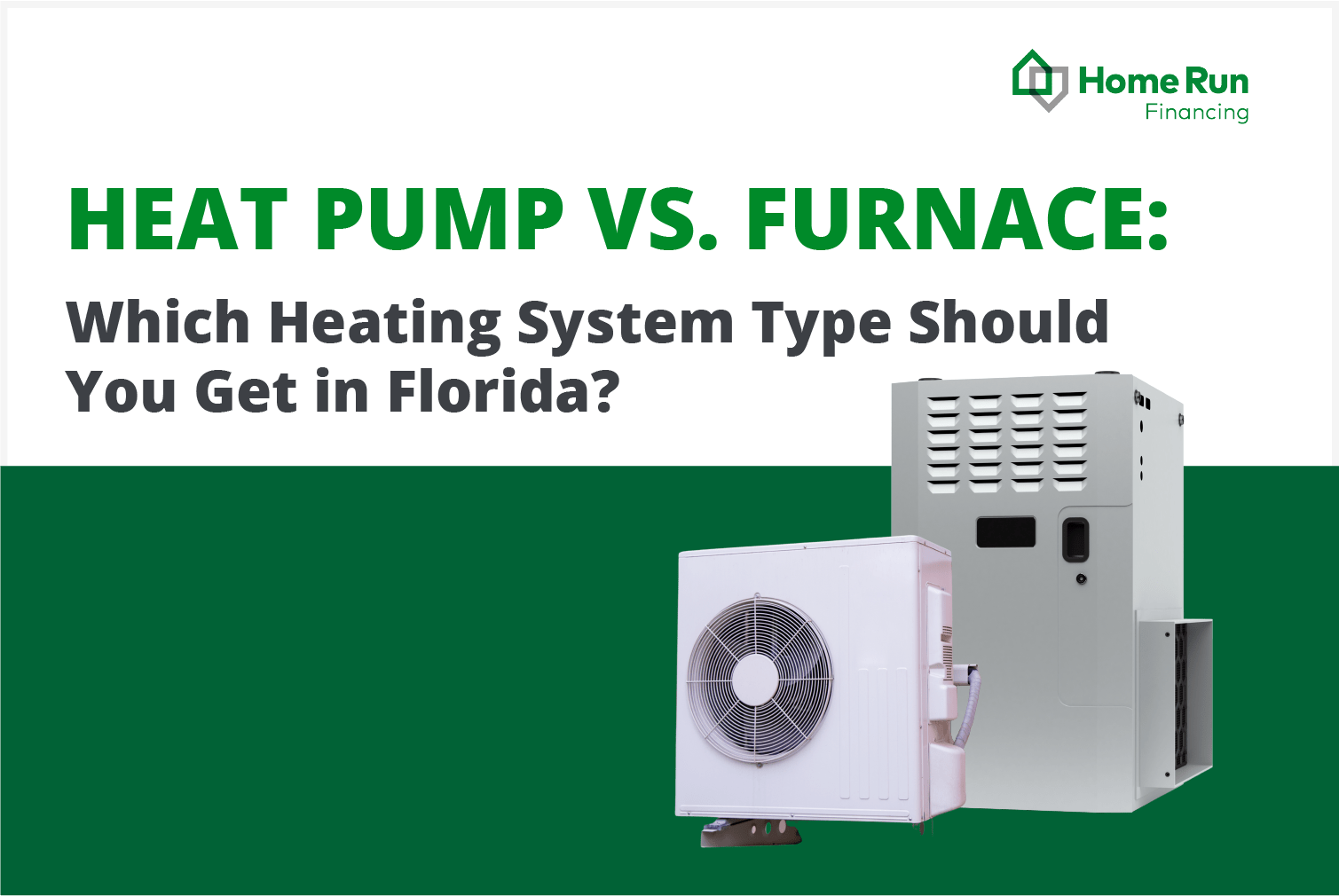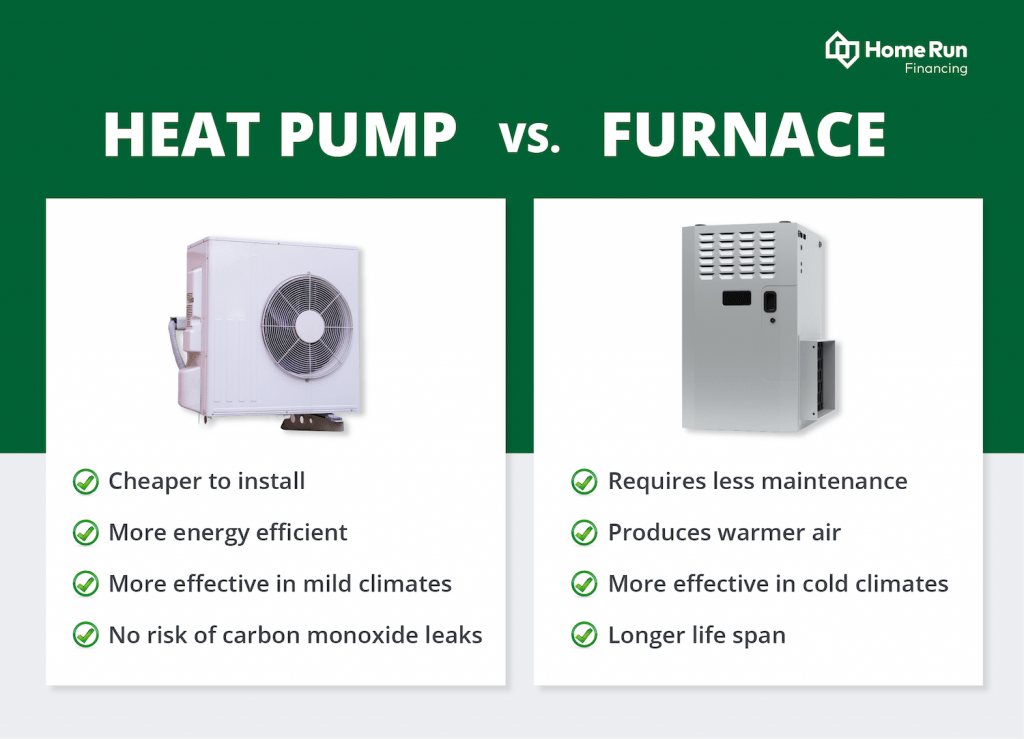
Heat Pump vs. Furnace: Which Heating System Type Should You Get in Florida?
Florida summers are long and humid, while the winters are short and mild. What Floridians may consider cold weather is barely chilly in other parts of the country. Do you need heating in Florida? Most Floridians agree that you do. Those occasional winter nights can feel pretty frosty, especially when you’re used to the heat and humidity of the Sunshine State.
Let’s take a look at heat pumps and furnaces and discuss the pros and cons of each type of system, including the cost of a heat pump vs. a furnace, to help you decide which heating system is right for your Florida home. And once you have a better idea of your options, we can also recommend the best way to finance your home improvement.
What’s a heat pump and how does it work?
What’s a furnace and how does it work?
Heat pump vs. furnace: Which is better?
- Heat pumps are cheaper to install than furnaces but may require more maintenance.
- Heat pumps are more efficient than furnaces.
- Heat pumps are more effective than furnaces in mild climates.
- Heat pumps are safer than furnaces but tend to blow colder air.
- Furnaces generally last longer than heat pumps.
Get help funding a new heat pump or furnace in Florida
What’s a heat pump and how does it work?
A heat pump doesn’t generate heat; it moves it, making it incredibly efficient to run. These devices work by transferring energy, pulling the warmth into the home and leaving the source cooler. A heat pump system can also work in reverse, pulling warmer air out of the home to leave it cooler.
Does a heat pump make sense in Florida? Since this type of system is ideal for mild winters and hot summers, it does. It also eliminates the need for a separate air conditioner within the home. Heat pumps are part of central heating, ventilation and air conditioning (HVAC) systems and are efficient heating options in Florida.
Types of heat pumps:
- Air-source heat pumps. This type transfers warm air to heat or cool the house as needed. High-efficiency heat pumps are cheap to run (most use electricity). They might struggle to maintain the temperature in freezing weather, but winter temps in the Sunshine State rarely dip low enough to cause problems.
- Water-source heat pumps. These devices take the heat energy from a nearby water source (pond, stream, river) to warm your home. They can cost more for initial installation, but they cost far less to run because they rely on sustainable natural resources. Obviously, you must have a nearby water source.
- Geothermal heat pumps. They take the natural heat from the ground to warm your home, which means they’re wonderfully efficient and can reduce heating and cooling energy consumption by up to 60%. But they can cost a lot more, and installation is a bigger, longer job.
What’s a furnace and how does it work?
A furnace heats air and uses a forced-air system to distribute it throughout the home using a coil, ducts or radiators. Furnaces are largely defined by how they heat air:
- Natural gas furnaces. The cheapest fuel source for running a furnace is natural gas. But you do require a connection to the gas line, which can be expensive to install if you don’t have one already.
- Electric furnaces. Rather than burning a fuel like natural gas or oil to heat air, this type of furnace uses electricity to heat coils. They are efficient and powerful but expensive to run.
- Oil furnaces. This type of furnace burns oil to heat air. Unlike natural gas, though, your fuel isn’t piped into your home. You’ll need to monitor how much oil you’ve got left in your tank and schedule deliveries to ensure you have enough.
Heat pump vs. furnace: Which is better?

So is a heat pump or a furnace better in Florida? Let’s compare them.
1. Heat pumps are cheaper to install than furnaces but may require more maintenance.
Comparing the cost of a heat pump vs. a furnace is hard to calculate accurately. A gas furnace is generally only run during the very coldest months in Florida, so maintenance needs are less than a pump, since it’s part of the air conditioning system and used all year round. But the higher maintenance needs and upfront costs of a heat pump are weighed against the cheaper installation costs and the dual purpose of an included air conditioning unit for cooling.
2. Heat pumps are more efficient than furnaces.
Energy consumption and efficiency is an important factor to consider when deciding how to heat your home. Living in Florida means you won’t need year-round heating. So, the overall energy consumption of a heat pump might seem high — that is until you realize that it will likely be working all year by keeping you warm in the cooler months and cool in the warmer months.
Newer heat pumps are so incredibly efficient that they can transfer up to 300 times the amount of energy in ideal conditions compared to older models. Even the most energy-efficient furnace will transfer only up to around 90%–98.5% of the heat produced, making it a lot less efficient than a heat pump.
3. Heat pumps are more effective than furnaces in mild climates.
Furnaces are designed to heat homes in extremely cold temperatures. And while that makes them ideal if you see regular snow, they might not be your most effective choice. Heat pumps are designed to work best in temperate climates, which makes them perfect for Florida.
4. Heat pumps are safer than furnaces but tend to blow colder air.
The air put out by a heat pump is cooler than that of a furnace, which some people don’t like. But because the air is cooler it retains natural levels of humidity, unlike with a dry furnace, and has a gentler effect on skin and hair. Furnaces also come with the risk of carbon monoxide leaks, making a well-maintained heat pump a much safer option.
5. Furnaces generally last longer than heat pumps.
The life span of a heat pump is generally around 10–15 years. After 10 years, they start to get less efficient and struggle to maintain air quality and stable temperatures.
Compared to a well-maintained furnace (which might last 20 years or more), a heat pump has more parts, which means more opportunities for those parts to break or get worn out. The good news is that technological advancements mean newer models are constantly becoming more and more efficient, so upgrading your heat pump after about 10 years is a good idea regardless, especially if you want to save even more money on energy bills.
Get help funding a new heat pump or furnace in Florida
Now you know what your heating options are in Florida and have an idea of the cost of a heat pump vs. a furnace — but how do you pay for it? When the time comes to replace your heating unit, you may worry about whether you can get home improvement financing.
PACE financing in Florida gives you the option of using your home equity to make major repairs such as a heat pump or furnace replacement without breaking your budget. Contact us today and find out how PACE financing works.
